In today's IT landscape, hiring a DevOps engineer has become a priority for organizations striving for seamless integration between development and operations. Many companies, however, struggle to understand what makes a DevOps engineer unique and how they drive efficiency across the software delivery lifecycle. It's not just about finding someone with technical prowess but a candidate who can bridge gaps between teams, foster a culture of collaboration, and automate processes effectively.
This article provides a comprehensive guide for recruiters and hiring managers on how to successfully hire a DevOps engineer. We'll discuss the skills and qualifications to look for, where to find the best talent, and the recommended steps in the hiring process. For more detailed insights into DevOps skills, you can visit our blog on skills required for DevOps engineers.
Table of contents
Why Hire a DevOps Engineer?
A DevOps Engineer can solve many common business challenges. They can help reduce deployment time, minimize system downtime, and improve collaboration between development and operations teams. For example, if your company struggles with slow software releases or frequent production issues, a DevOps Engineer could streamline these processes.
Consider hiring a DevOps Engineer when:
- Your development and operations teams work in silos
- You want to implement continuous integration and delivery
- You need to improve your infrastructure scalability and reliability
Before committing to a full-time hire, you might want to start with a DevOps skills assessment to understand the specific expertise needed. Alternatively, you could engage a consultant to evaluate your current processes and recommend improvements before building an in-house DevOps team.
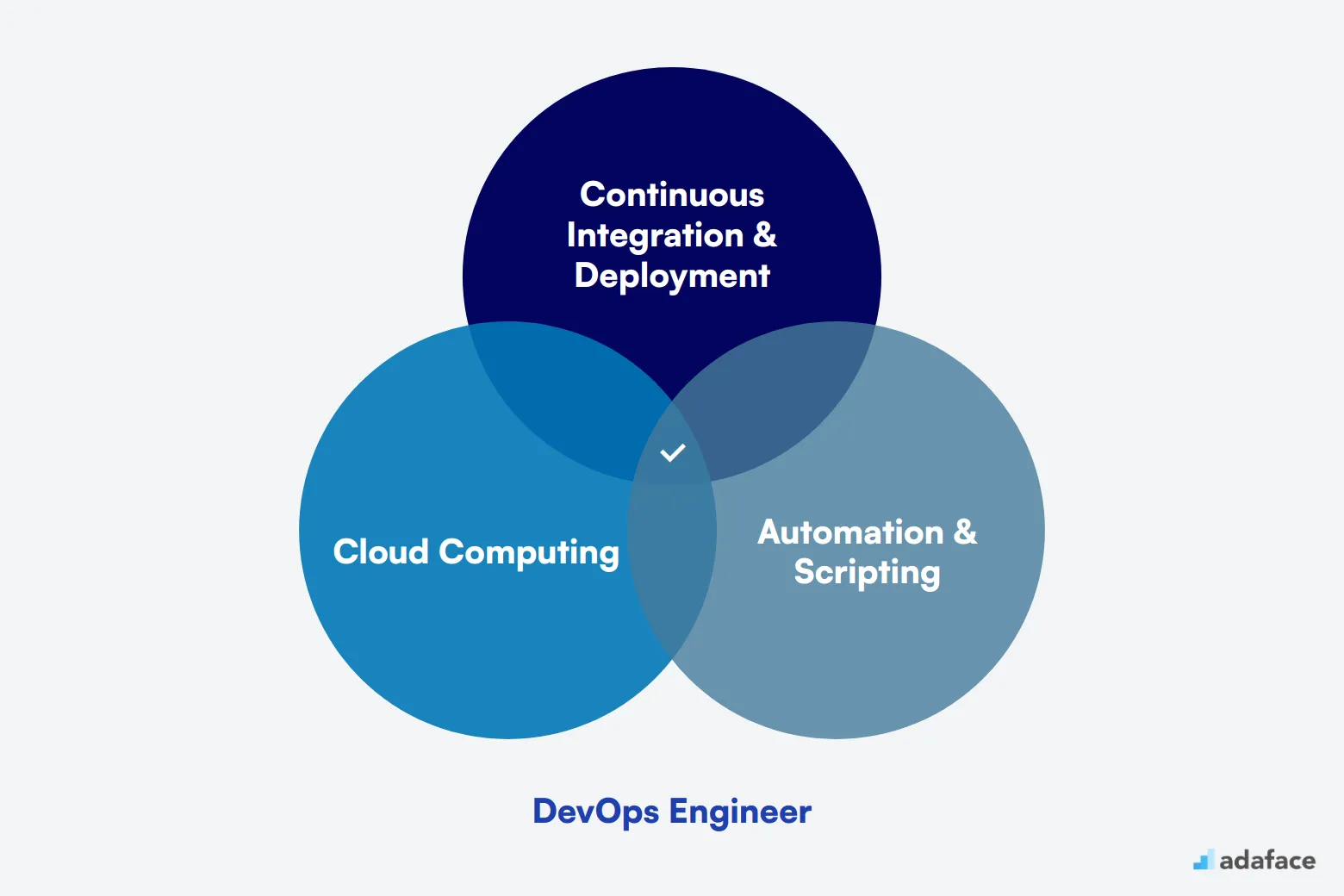
What Does a DevOps Engineer Do?
A DevOps Engineer bridges the gap between software development and IT operations. They work to streamline the software delivery process, improve collaboration between teams, and ensure smooth deployment and maintenance of applications.
The day-to-day responsibilities of a DevOps Engineer include:
- Implementing and managing continuous integration and delivery (CI/CD) pipelines
- Automating infrastructure provisioning and configuration management
- Monitoring system performance and troubleshooting issues
- Ensuring security and compliance throughout the development lifecycle
- Collaborating with development and operations teams to improve processes
- Managing and optimizing cloud infrastructure
Skills and qualifications to look for in a DevOps Engineer
Hiring a DevOps Engineer requires a clear understanding of both the technical and soft skills necessary for the role. Many recruiters struggle with differentiating between what is required and what is preferred. This often leads to lengthy candidate lists that may not align with the actual needs of the team.
It's important to build a candidate profile that reflects your company's unique environment and tech stack. A role may demand specific tools and practices, while other skills can be more flexible based on your team's capacity to train or adapt. Below is a breakdown of common required and preferred skills and qualifications.
| Required skills and qualifications | Preferred skills and qualifications |
|---|---|
| Bachelor's degree in Computer Science, IT, or a related field | Experience with configuration management tools like Ansible, Puppet, or Chef |
| 3+ years of experience in DevOps or a related field | Familiarity with containerization tools like Docker and orchestration with Kubernetes |
| Proficient with CI/CD tools such as Jenkins, GitLab CI/CD | Knowledge of monitoring tools such as Prometheus, Grafana, or Nagios |
| Experience with cloud platforms like AWS, Azure, or Google Cloud | Background in network security practices and tools |
| Strong scripting skills in languages such as Python, Bash, or Shell | Experience with Agile methodologies and working in a Scrum team |
Top Platforms to Hire DevOps Engineers
Now that you have a clear job description, it's time to source candidates by listing the position on various job platforms. Utilizing multiple job listing sites can help you reach a broad audience and find the right DevOps Engineer who fits your needs.
LinkedIn is a professional networking platform ideal for sourcing full-time DevOps Engineers. It offers a wide network of professionals with varied experience levels.

Indeed
Indeed is a popular job listing site that provides access to a large pool of candidates, suitable for recruiting full-time DevOps Engineers.

Upwork
Upwork is a global freelancing platform ideal for hiring DevOps Engineers for short-term or project-based work.

Among the many options available, LinkedIn and Indeed stand out as excellent platforms for full-time positions, offering vast networks of professionals. For freelance opportunities, Upwork and Toptal provide access to highly skilled talent. Additionally, niche platforms like Stack Overflow Jobs cater to technical roles, while AngelList is perfect for startups seeking engineers who thrive in dynamic environments.
Keywords to Look for in DevOps Engineer Resumes
Resume screening helps you quickly filter through many applicants for DevOps Engineer positions. It's a time-saver that lets you focus on the most promising candidates.
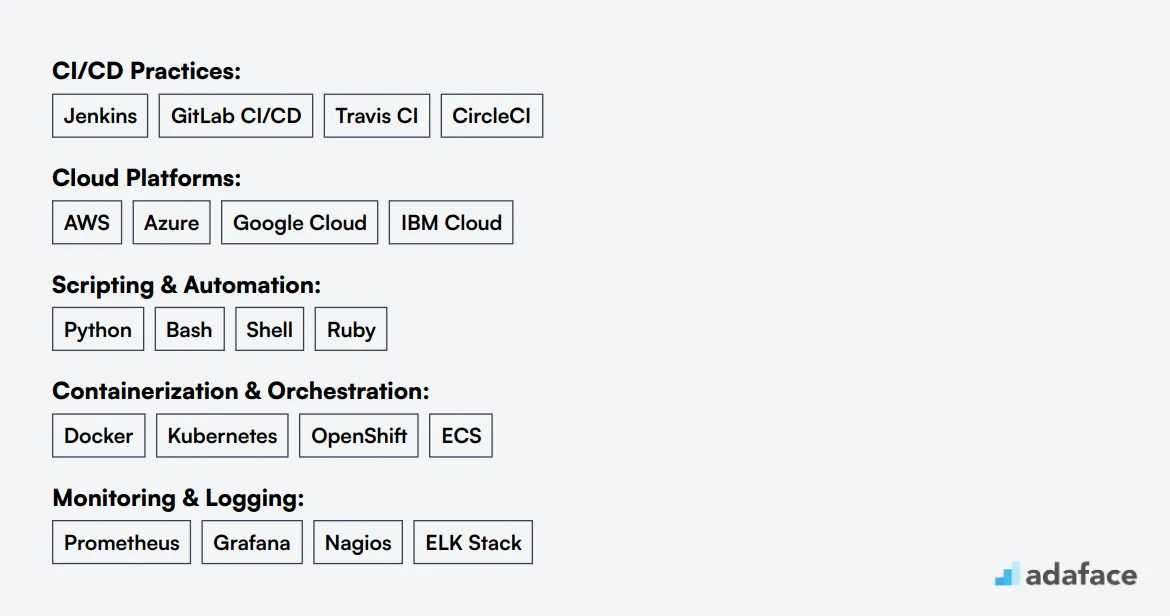
To manually screen resumes, look for key technical skills and experiences. Scan for terms like CI/CD, cloud platforms, scripting languages, and containerization tools. This approach helps you shortlist candidates who align with your DevOps Engineer job description.
AI tools can streamline the screening process. You can use ChatGPT or similar AI to analyze resumes based on specific criteria. This method can be faster and more consistent than manual screening, especially for large volumes of applications.
Here's a sample prompt for AI resume screening:
TASK: Screen resumes for DevOps Engineer role
INPUT: Resumes
OUTPUT: For each resume, provide:
- Name
- Matching keywords
- Score (out of 10)
- Recommendation
- Shortlist (Yes/No/Maybe)
KEYWORDS:
- CI/CD (Jenkins, GitLab CI/CD)
- Cloud (AWS, Azure, Google Cloud)
- Scripting (Python, Bash, Shell)
- Containerization (Docker, Kubernetes)
- Monitoring (Prometheus, Grafana)
Customize this prompt based on your specific DevOps Engineer requirements.
Recommended Skills Tests for Assessing DevOps Engineers
Skills tests are a great way to evaluate DevOps Engineers beyond their resumes. They provide objective insights into a candidate's technical abilities and problem-solving skills. Here are five key tests we recommend for assessing DevOps Engineers:
Linux skills test: This test evaluates a candidate's proficiency in Linux, a core component of most DevOps environments. It assesses knowledge of command-line operations, system administration, and scripting abilities.
Docker skills test: Docker is a fundamental tool in containerization. This test measures a candidate's understanding of Docker concepts, container management, and deployment strategies.
Kubernetes skills test: Kubernetes is key for container orchestration in DevOps. The test evaluates knowledge of Kubernetes architecture, pod management, and scaling applications.
AWS DevOps test: For cloud-based DevOps roles, this test assesses familiarity with AWS services, CI/CD pipelines, and infrastructure as code concepts specific to the AWS ecosystem.
Git skills test: Version control is critical in DevOps. This test evaluates a candidate's proficiency in Git operations, branching strategies, and collaboration workflows.
Structuring the Interview Stage for DevOps Engineers
Once candidates successfully pass the skills tests, it's time to assess their hard skills through technical interviews. While skills tests are effective in filtering out unfit candidates, they don't always identify the best-suited individuals for the role. Hence, a well-structured interview is crucial to digging deeper into technical capabilities. This is where tailored interview questions come into play.
When interviewing DevOps engineers, consider asking questions that gauge both their technical prowess and problem-solving abilities. For instance, "How do you manage continuous integration and deployment in a dynamic project?" tests their experience and adaptability. "Can you explain your experience with Kubernetes?" helps understand their proficiency with tools. Similarly, "Describe a challenging project where you implemented infrastructure as code" assesses their practical experience. Other questions like "How do you ensure system security in cloud environments?" and "Explain a time you optimized a deployment pipeline" can reveal their strategic thinking and innovation skills.
How much does it cost to hire a DevOps Engineer?
The cost of hiring a DevOps Engineer varies widely based on location, experience, and industry demand. In the United States, salaries range from $82,761 to $190,003, with a median of $125,399. Canadian DevOps Engineers see a range between CAD 69,259 and CAD 142,012, with a median of CAD 99,175. Keep in mind that top-paying cities like San Francisco and Vancouver can significantly impact salary expectations. These figures are a starting point, and market conditions may fluctuate.
DevOps Engineer Salary in the United States
DevOps Engineers in the United States earn competitive salaries. Based on recent data, the average annual salary for DevOps Engineers ranges from $82,761 to $190,003, with a median of $125,399.
Location plays a big role in determining salaries. Top-paying cities include San Francisco, CA ($158,038 median), Annapolis Junction, MD ($163,718 median), and New York, NY ($137,971 median).
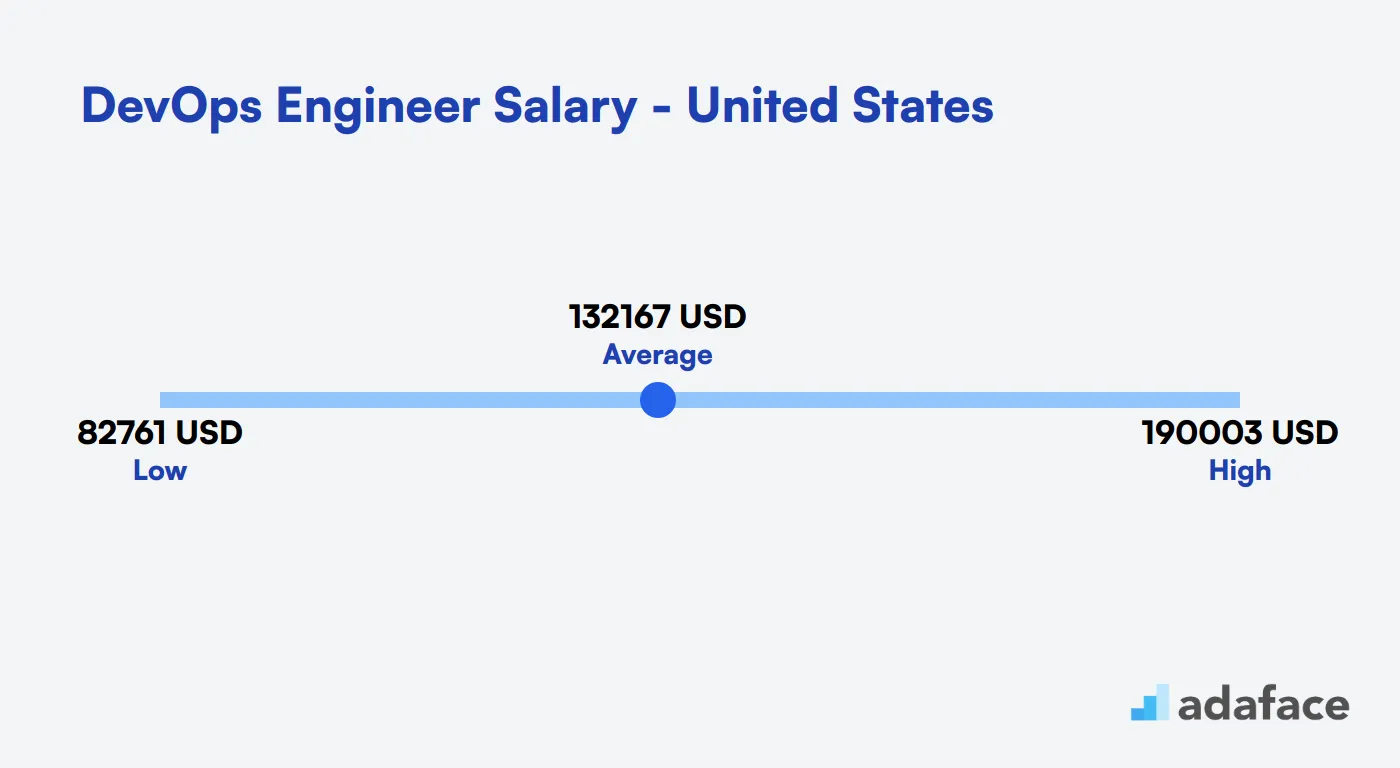
DevOps Engineer Salary in the United Kingdom
In the UK, DevOps Engineers command competitive salaries. As of 2023, the average annual salary for a DevOps Engineer in the United Kingdom ranges from £45,000 to £75,000. Entry-level positions typically start around £35,000, while senior roles with extensive experience can fetch upwards of £100,000 per year.
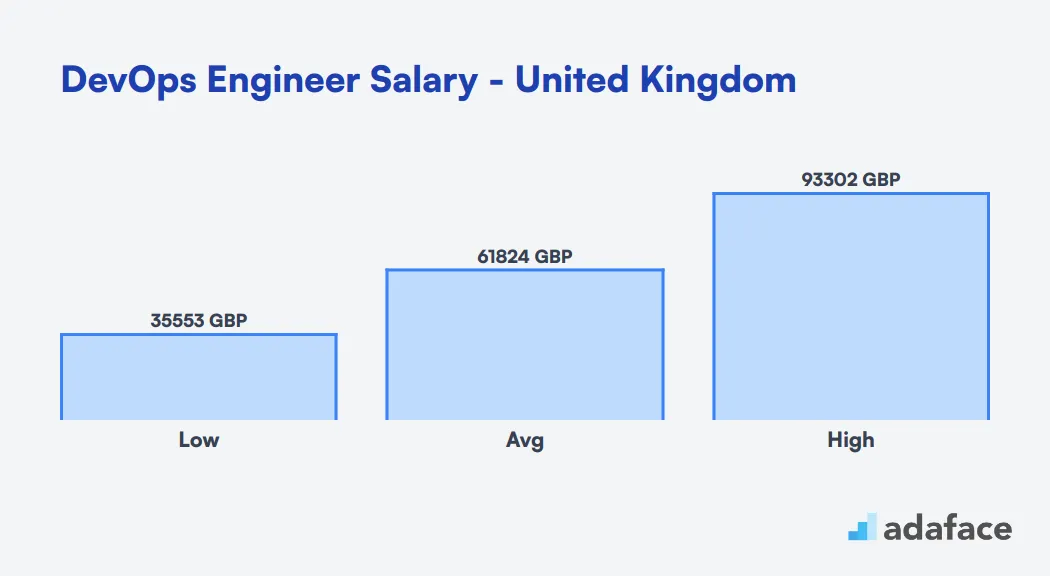
DevOps Engineer Salary in Canada
DevOps Engineers in Canada earn competitive salaries. The average annual salary ranges from CAD 69,259 to CAD 142,012, with a median of CAD 99,175.
Top-paying cities for DevOps Engineers in Canada include:
- Vancouver, BC: CAD 76,394 - CAD 153,858
- Calgary, AB: CAD 75,816 - CAD 145,266
- Toronto, ON: CAD 75,047 - CAD 146,137
Factors affecting salary include experience, skills, and company size. Keep in mind that these figures can vary based on current market conditions and individual qualifications.
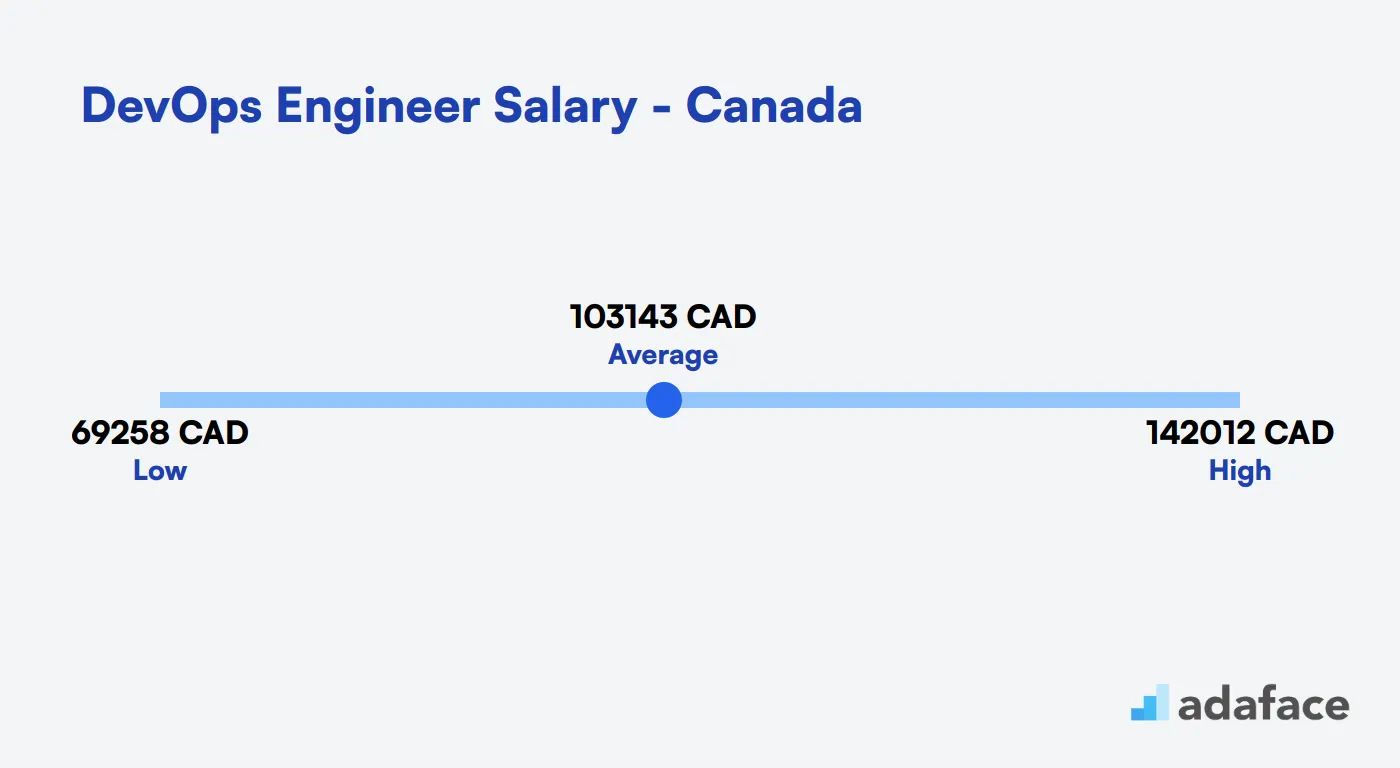
What's the difference between a DevOps Engineer and a Site Reliability Engineer?
At first glance, DevOps Engineers and Site Reliability Engineers (SREs) might seem interchangeable, but their primary focus and responsibilities differ significantly. This confusion often arises because both roles aim to bridge gaps between development and operations, yet they pursue different objectives.
DevOps Engineers concentrate on development and operations, streamlining processes through automation of CI/CD pipelines to achieve speed and efficiency. They often collaborate with developers and sysadmins, using tools like Docker, Jenkins, and Ansible, and typically require skills in Python, Bash, or Ruby. The goal is to simplify and expedite the software development lifecycle.
In contrast, Site Reliability Engineers focus on the reliability and stability of systems. Their main responsibilities include monitoring, alerting, and incident response to ensure system uptime. SREs work closely with ops, dev, and product teams using tools such as Prometheus and Grafana. They emphasize skills in Go, Python, and Shell scripting. To understand more about the specific skills required for DevOps Engineers, you can explore further insights.
While both roles hold a degree in Computer Science or a related field, the distinction lies in their core objectives—DevOps Engineers focus on speed and integration, whereas SREs prioritize uptime and reliability.
| DevOps Engineer | Site Reliability Engineer | |
|---|---|---|
| Primary Focus | Development and Operations | Reliability and Stability |
| Core Responsibility | Automating CI/CD pipelines | Monitoring and alerting |
| Goal | Speed and efficiency | System uptime |
| Tools Used | Docker, Jenkins, Ansible | Prometheus, Grafana, SRE tools |
| Skills Emphasis | Automation, Integration | Incident response, Monitoring |
| Programming Languages | Python, Bash, Ruby | Go, Python, Shell |
| Collaboration | Developers, SysAdmins | Ops, Dev, Product teams |
| Education | Computer Science Degree | Computer Science/IT Degree |
Hire the Best DevOps Engineers for Your Team
We've covered the key aspects of hiring DevOps Engineers, from understanding their role to identifying essential skills and qualifications. We've also explored effective hiring platforms, resume keywords, and interview strategies to help you find the right candidates.
The most important takeaway is to use well-crafted job descriptions and targeted skills assessments to ensure accurate hiring. Consider using a DevOps online test to evaluate candidates' technical abilities and make data-driven decisions in your recruitment process.
DevOps Test
FAQs
A DevOps engineer is responsible for automating and streamlining operations and processes, working closely with software developers and IT staff to oversee code releases, and ensuring system reliability and performance.
Key skills include proficiency in cloud services, coding and scripting, understanding of CI/CD, experience with infrastructure as code, and soft skills like collaboration and problem-solving.
Top platforms for hiring DevOps engineers include LinkedIn, GitHub, Stack Overflow, and specialized job boards like DevOpsJobs.net.
Consider using skills tests such as those found on Adaface's assessment platform to evaluate DevOps-specific skills and technical proficiency.
Avoid focusing solely on technical skills without evaluating the candidate's ability to work collaboratively. It's also important not to overlook the need for a cultural fit within the team.
While both roles involve systems management and automation, a DevOps engineer typically focuses on improving collaboration between development and operations teams, whereas a Site Reliability Engineer (SRE) focuses more on ensuring system reliability and uptime.
A DevOps engineer job description should outline the main responsibilities, required skills and experience, preferred qualifications, and details about the company culture. You can find a detailed template on Adaface's site.

40 min skill tests.
No trick questions.
Accurate shortlisting.
We make it easy for you to find the best candidates in your pipeline with a 40 min skills test.
Try for freeRelated posts
Free resources



